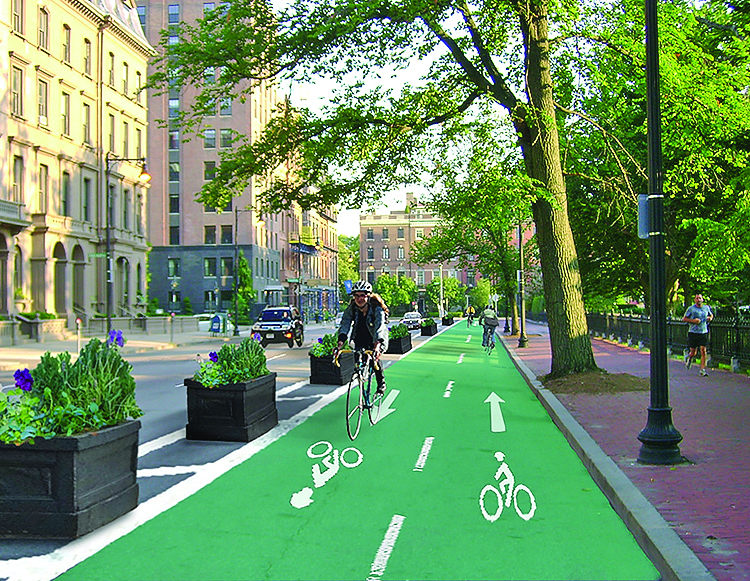Bike Lanes Pedal Past Cracked, Crumbling Sidewalks As City Council Delays Repair Due To A ‘Built-In Bias’
by Glen Richardson
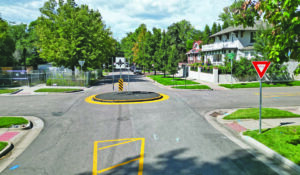
Small Roundabouts Big Problem: New “bikeway” roundabouts are causing accidents and slowing the response time for emergency vehicles. Denver Fire has paused its approval.
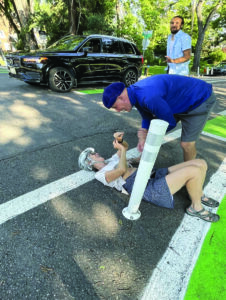
Reworked Doesn’t Work: Reconfigured bike lanes cut across and to the side of the 7th Ave. & Williams intersection. A blind spot caused resident Jan Douglas to take a spill. Photo: Channel 7, KMGH-TV
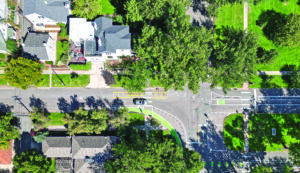
Disorderly Design: Bike lane intersection designs by Denver’s DOTI are creating chaos for motorists, pedestrians, and bicyclists. This helter-skelter design is at 7th Ave. and Williams St.
If sidewalks are for pedestrians, why did Denver’s bicycle lobby campaign for a sidewalk tax?
Biking advocates — using the name Denver Streets Partnership — launched the 307 Campaign in Aug. 2022 promoting “Denver Deserves Sidewalks.” The campaign claimed it would remove the responsibility for repairs from adjacent property owners and place the responsibility on the City of Denver. Through a “modest annual fee” citywide construction and repair of sidewalks would be underway and finished in nine years.
Passing with 55.85% of the vote last November, residents using wheelchairs, crutches, canes, plus those with visual or cognitive impairment, would soon be using sidewalks. So would children and older pedestrians with reduced motor skills.
Fee Collection Delayed
A year later there are still no sidewalk repairs, nor will there be any until at least until July of next year. The Denver City Council has voted to delay property owner collection fees until July 1, 2024. That’s more than 18 months after voter approval and six months after it was initially scheduled to begin.
City Council decided on the delay due to rising concerns expressed by prope
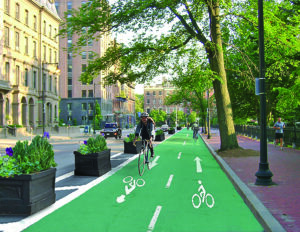
Chic Lanes Vs. Cracked Sidewalks: These hypothetical, idealized bike lanes are planned to be imposed throughout the city. Pedestrians and wheelchair users continue to watch their step as the gulf between the two uses widens.
rty owners. Increasingly, property owners told council members the Streets Partnership built bias and discrimination into the plan.
“I am part of the unfortunate 15% of people who will be paying over $400 a year in sidewalk fees simply because I am unlucky enough to live on a corner lot,” says Erin Feldman. Like so many others, Feldman urged City Council not to roll the plan out without further consideration and planning. “They’re gross inequities in the plan and it is an unfair burden for people like me,” she tells the Chronicle.
Hit On Homeowners?
Before the Denver Deserves Sidewalks initiative passed in 2022, property owners were responsible for maintaining their own sidewalks as needed. The new Street Partnership funding structure instead collects money from homeowners based on linear footage of the property, wealth of the neighborhood, and if the home is on a corner lot.
Homeowners being responsible for their own sidewalks is akin to how other big cities take care of sidewalks. In Chicago, property owners and the city share the cost of replacing sidewalks. The cost per square foot to property owners is well below what a private contractor would charge. Through their Sidewalks Repair Program, New York City performs free repairs for qualifying broken sidewalks.
Advocates still claim the change is a safety and accessibility win in a city with so many broken and nonexistent sidewalks. But questions remain about how long the rollout will take, how much the program will actually cost, and what will done about properties with extremely high fees.
Sudden Switcheroo
Duped, misled, hoodwinked?
Throughout the campaign the Denver Streets Partnership promoted itself as a local street safety advocacy group. Today, however, the Street Partnership and Jill
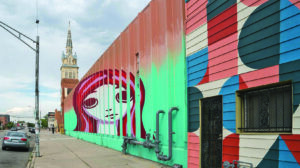
Sad Sidewalk Symbol: Larimer Girl mural by local artist Jeremy Burns seems to suggest sadness and disappointment in Denver’s sidewalks.
Locantore, the executive director, are staff members of the nonprofit advocacy organization Bicycle Colorado. WalkDenver has also merged with Bicycle Colorado. Staff members of the former groups still claim to support sidewalk improvements.
As the state’s political advocacy group for bikers, Bicycle Colorado helped pass Denver ballot measure 2A, creating the state’s first eBike subsidy. The city’s E-Bike rebates are designed to build an army of bike lane advocates. They also helped to get $12 million for the eBike subsidy program inserted into the Clean Air Grant program; and added over $1 billion in funding to the statewide transportation bill. Moreover, Bicycle Colorado has funded and promoted the increasingly controversial 196 miles of on-street bike lanes in Denver.
Biker Bunny Hop
The Denver 307 Campaign’s promise to repair deteriorating sidewalks still awaits the overhaul to begin. So does the construction of new sidewalks where needed, or upgrading walks to ADA standards.
Nonetheless, the bike lobby continues to bunny hop over the city’s cracked sidewalks, adding 24 miles of painted bike lanes, 45 miles of buffered bike lanes, 23 miles of protected bike lanes, and 34 miles of neighborhood bikeways. Cost to the city so far is $13.4 million.
In addition, critics claim Denver’s Department of Transportation & Infrastructure (DOTI) is primarily giving bikers multiple ways to get around town, rather than a system for all people.
Bike Lane Impact
Denver expanded the ways the streets are used without being able to expand the streets. Their width is unchanged, but on many blocks, traffic lanes were narrowed to create space for a bike lane. On streets with protected bike lanes, a narrow buffer has also been squeezed in, making the traffic lanes even thinner.
Detractors say that due to being poorly planned, narrower streets in Denver are filled with cars and “mostly empty” bike lanes.
Denver and other cities were never intended to accommodate bike lanes, they argue. They also claim bike lanes make the worst common cycling accidents more common. Adding them also reduces parking spaces for cars and increases traffic jams. The debate also reflects tension over the future of cities, and anxiety over a new pattern of urban planning that no longer prioritizes the automobile.
Bike Owners Vs. Lobby
Albeit a powerful city-state political money moocher, Bicycle Colorado represents a small segment of Denver’s biking community. Most of the approximately 560,000 metro bicycle owners don’t participate in or fathom what the organization does.
Denver has had 889 bicycle thefts reported so far this year. Despite averaging 96.2 robberies per month, the lobby does little more than proclaim they “provide a voice for people who ride bicycles.”
Bike to Work Day — the free Denver Regional Council of Governments backed event — had 17,981 riders in 2023. A Winter Bike to Work Day in 2024 is set for Friday, Feb. 9, followed by the Wednesday, June 16, Bike to Work Day.

